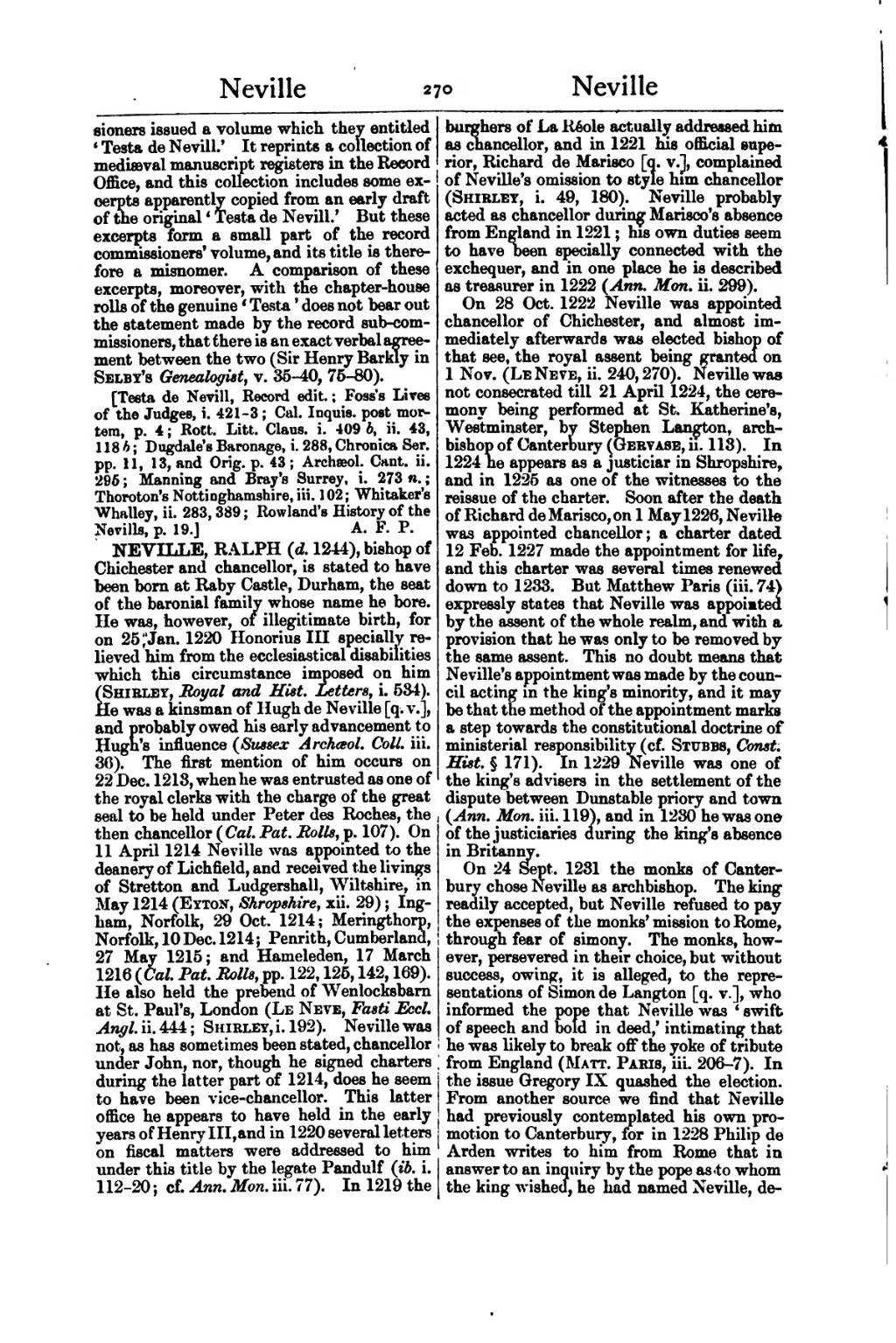sioners issued a volume which they entitled ‘Testa de Nevill.’ It prints a collection of mediæval manuscript registers in the Record Office, and this collection includes some excerpts apparently copied from an early draft of the original ‘Testa de Nevill.’ But these excerpts form a small part of the record commissioners' volume, and its title is therefore a misnomer. A comparison of these excerpts, moreover, with the chapter-house rolls of the genuine ‘Testa’ does not bear out the statement made by the record sub-commissioners, that there is an exact verbal agreement between the two (Sir Henry Barkly in Selby's Genealogist, v. 35–40, 75–80).
[Testa de Nevill, Record edit.; Foss's Lives of the Judges, i. 421–3; Cal. Inquis. post mortem, p. 4; Rott. Litt. Claus. i. 409 b, ii. 43, 118 b; Dugdale's Baronage, i. 288, Chronica Ser. pp. 11, 13, and Orig. p. 43; Archæol. Cant. ii. 295; Manning and Bray's Surrey, i. 273 n.; Thoroton's Nottinghamshire, iii. 102; Whitaker's Whalley, ii. 283, 389; Rowland's History of the Nevills, p. 19.]
NEVILLE, RALPH (d. 1244), bishop of Chichester and chancellor, is stated to have been born at Raby Castle, Durham, the seat of the baronial family whose name he bore. He was, however, of illegitimate birth, for on 25 Jan. 1220 Honorius III specially relieved him from the ecclesiastical disabilities which this circumstance imposed on him (Shirley, Royal and Hist. Letters, i. 534). He was a kinsman of Hugh de Neville [q. v.], and probably owed his early advancement to Hugh's influence (Sussex Archœol. Coll. iii. 36). The first mention of him occurs on 22 Dec. 1213, when he was entrusted as one of the royal clerks with the charge of the great seal to be held under Peter des Roches, the then chancellor (Cal. Pat. Rolls, p. 107). On 11 April 1214 Neville was appointed to the deanery of Lichfield, and received the livings of Stretton and Ludgershall, Wiltshire, in May 1214 (Eyton, Shropshire, xii. 29); Ingham, Norfolk, 29 Oct. 1214; Meringthorp, Norfolk, 10 Dec. 1214; Penrith, Cumberland, 27 May 1215; and Hameleden, 17 March 1216 (Cal. Pat. Rolls, pp. 122, 125, 142, 169). He also held the prebend of Wenlocksbarn at St. Paul's, London (Le Neve, Fasti Eccl. Angl. ii. 444; Shirley, i. 192). Neville was not, as has sometimes been stated, chancellor under John, nor, though he signed charters during the latter part of 1214, does he seem to have been vice-chancellor. This latter office he appears to have held in the early years of Henry III, and in 1220 several letters on fiscal matters were addressed to him under this title by the legate Pandulf (ib. i. 112–20; cf. Ann. Mon. iii. 77). In 1219 the burghers of La Réole actually addressed him as chancellor, and in 1221 his official superior, Richard de Marisco [q. v.], complained of Neville's omission to style him chancellor (Shirley, i. 49, 180). Neville probably acted as chancellor during Marisco's absence from England in 1221; his own duties seem to have been specially connected with the exchequer, and in one place he is described as treasurer in 1222 (Ann. Mon. ii. 299).
On 28 Oct. 1222 Neville was appointed chancellor of Chichester, and almost immediately afterwards was elected bishop of that see, the royal assent being granted on 1 Nov. (Le Neve, ii. 240, 270). Neville was not consecrated till 21 April 1224, the ceremony being performed at St. Katherine's, Westminster, by Stephen Langton, archbishop of Canterbury (Gervase, ii. 113). In 1224 he appears as a justiciar in Shropshire, and in 1225 as one of the witnesses to the reissue of the charter. Soon after the death of Richard de Marisco, on 1 May 1226, Neville was appointed chancellor; a charter dated 12 Feb. 1227 made the appointment for life, and this charter was several times renewed down to 1233. But Matthew Paris (iii. 74) expressly states that Neville was appointed by the assent of the whole realm, and with a provision that he was only to be removed by the same assent. This no doubt means that Neville's appointment was made by the council acting in the king's minority, and it may be that the method of the appointment marks a step towards the constitutional doctrine of ministerial responsibility (cf. Stubbs, Const. Hist. § 171). In 1229 Neville was one of the king's advisers in the settlement of the dispute between Dunstable priory and town (Ann. Mon. iii. 119), and in 1230 he was one of the justiciaries during the king's absence in Britanny.
On 24 Sept. 1231 the monks of Canterbury chose Neville as archbishop. The king readily accepted, but Neville refused to pay the expenses of the monks' mission to Rome, through fear of simony. The monks, however, persevered in their choice, but without success, owing, it is alleged, to the representations of Simon de Langton [q. v.], who informed the pope that Neville was ‘swift of speech and bold in deed,’ intimating that he was likely to break off the yoke of tribute from England (Matt. Paris, iii. 206–7). In the issue Gregory IX quashed the election. From another source we find that Neville had previously contemplated his own promotion to Canterbury, for in 1228 Philip de Arden writes to him from Rome that in answer to an inquiry by the pope as to whom the king wished, he had named Neville, de-
